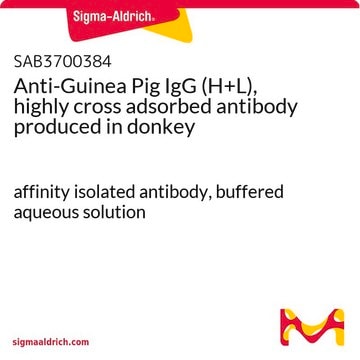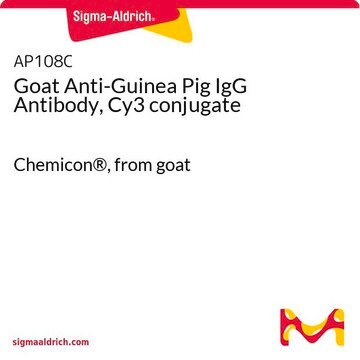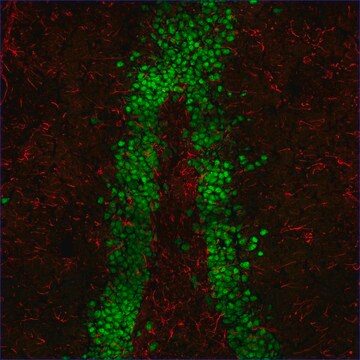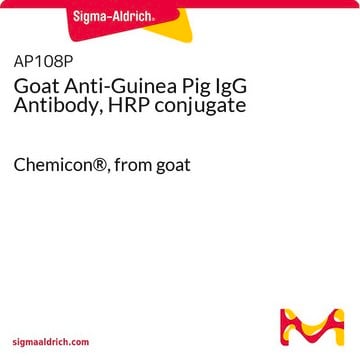AP193C
Donkey Anti-Guinea Pig IgG Antibody, Cy3 conjugate, Species Adsorbed
Chemicon®, from donkey
Sign Into View Organizational & Contract Pricing
All Photos(1)
About This Item
UNSPSC Code:
12352203
eCl@ss:
32160702
NACRES:
NA.46
Recommended Products
biological source
donkey
Quality Level
conjugate
CY3 conjugate
antibody form
F(ab′)2 fragment of affinity isolated antibody
antibody product type
secondary antibodies
clone
polyclonal
species reactivity
guinea pig
manufacturer/tradename
Chemicon®
technique(s)
immunofluorescence: suitable
shipped in
wet ice
target post-translational modification
unmodified
Application
Detect Donkey Guinea Pig IgG using this Donkey anti-Guinea Pig IgG Antibody, Cy3 conjugate, Species Adsorbed validated for use in IF.
Research Category
Secondary & Control Antibodies
Secondary & Control Antibodies
Research Sub Category
Secondary Antibodies Adsorbed for Dual Labeling
Secondary Antibodies Adsorbed for Dual Labeling
Legal Information
CHEMICON is a registered trademark of Merck KGaA, Darmstadt, Germany
Disclaimer
Unless otherwise stated in our catalog or other company documentation accompanying the product(s), our products are intended for research use only and are not to be used for any other purpose, which includes but is not limited to, unauthorized commercial uses, in vitro diagnostic uses, ex vivo or in vivo therapeutic uses or any type of consumption or application to humans or animals.
Not finding the right product?
Try our Product Selector Tool.
Hazard Statements
Precautionary Statements
Hazard Classifications
Aquatic Chronic 3
Storage Class Code
11 - Combustible Solids
WGK
WGK 3
Certificates of Analysis (COA)
Search for Certificates of Analysis (COA) by entering the products Lot/Batch Number. Lot and Batch Numbers can be found on a product’s label following the words ‘Lot’ or ‘Batch’.
Already Own This Product?
Find documentation for the products that you have recently purchased in the Document Library.
Ronald G Gregg et al.
iScience, 26(4), 106499-106499 (2023-04-24)
Complete congenital stationary night blindness (cCSNB) is a heterogeneous disorder characterized by poor dim-light vision, myopia, and nystagmus that is caused by mutations in genes critical for signal transmission between photoreceptors and depolarizing bipolar cells (DBCs). One such gene, LRIT3
Non-epithelial stem cells and cortical interneuron production in the human ganglionic eminences.
Hansen, DV; Lui, JH; Flandin, P; Yoshikawa, K; Rubenstein, JL; Alvarez-Buylla, A; Kriegstein, AR
Nature Neuroscience null
Yuki Kuwabara et al.
Frontiers in neuroscience, 17, 1091230-1091230 (2023-02-17)
Dorsal root ganglion stimulation (DRGS) may serve as a novel neuromodulation strategy to reduce cardiac sympathoexcitation and ventricular excitability. In this pre-clinical study, we investigated the effectiveness of DRGS on reducing ventricular arrhythmias and modulating cardiac sympathetic hyperactivity caused by
Y H Huang et al.
European journal of histochemistry : EJH, 53(2), e10-e10 (2009-06-29)
We used immunofluorescence double staining method to investigate the cellular localization of glucagon and pancreatic polypeptide (PP) in rat pancreatic islets. The results showed that both A-cells (glucagon-secreting cells) and PP-cells (PP-secreting cells) were located in the periphery of the
Ekaterina P Demina et al.
Journal of neuroinflammation, 15(1), 336-336 (2018-12-07)
The extension of sepsis encompassing the preterm newborn's brain is often overlooked due to technical challenges in this highly vulnerable population, yet it leads to substantial long-term neurodevelopmental disabilities. In this study, we demonstrate how neonatal neuroinflammation following postnatal E.
Our team of scientists has experience in all areas of research including Life Science, Material Science, Chemical Synthesis, Chromatography, Analytical and many others.
Contact Technical Service








